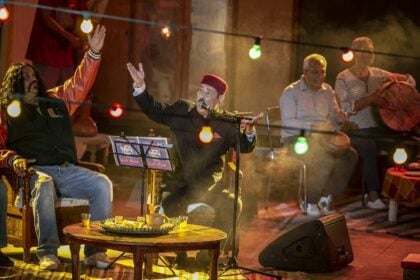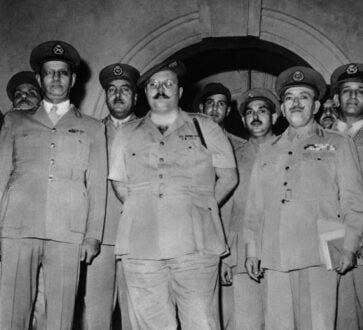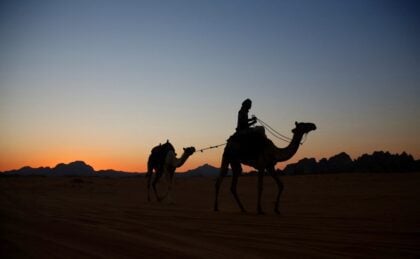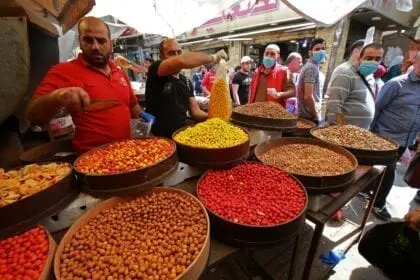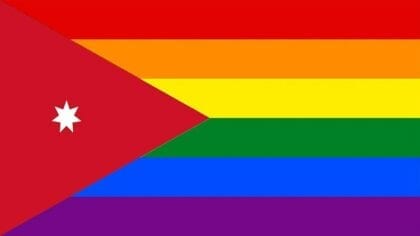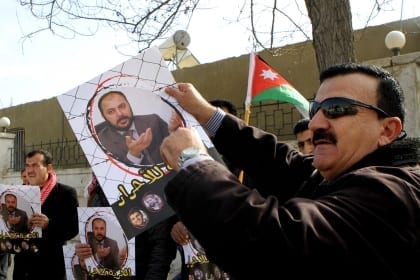
Introduction
For centuries, the region that comprises the modern state of Jordan was sparsely populated, but the population has increased rapidly from the second half of the 20th century.
The Department of Statistics in the Kingdom of Jordan estimated the country’s population at 10.81 million people in 2020, distributed to 54.64% males (5.766 million people), and 45.54% females (5.084 million people). A cumulative growth rate of 13.07% during the five years since the end of 2015, which witnessed the last official population and housing census, and an average growth rate of 2.61% annually.
According to the latest national census for the year 2015, the population of Jordan was 9,531,712 people, 53% males, and 47% females. The population of the Kingdom more than 10 times over the 55 years preceding the census, as the population reached 900,800 people in 1961. The average rate of population growth during the period between 2004-2015 was about 5.3%, and the increase in the growth rate is due to the high rates of immigration and asylum in the Kingdom, due to tensions in neighboring countries (Iraq and Syria). The average population growth rate for Jordanians was 3.1%, compared to 18% for non-Jordanians.
The number of families in (2015) reached 1,977,534 families, the average size of the family was 4.8 individuals, compared to 5.4 individuals in 2004 AD, and 6.1 individuals in the year 1994 AD. According to nationalities, the latest national census estimated the number of Jordanians at 6.6 million (69.39%) of the total population, while the number of non-Jordanians was estimated at 2.9 million (30.61%).
Before the Arab Spring uprisings, Muslims in Jordan accounted for 97.2% (Sunni majority) of the total population in 2010 estimates, according to the CIA’s World Factbook, while Christians formed 2.2% (the majority were Greek Orthodox, some Roman Catholics, and Roman Orthodox) Coptic Orthodox, Armenian Orthodox, and Protestant sects), the remaining minority of Buddhists is 0.4%, Hindus 0.1%, Jews <0.1%.
The non-Jordanian population was estimated at 1.266 million, (13.28% of the total population of Jordan) in 2015, followed by the Egyptians at about 636 thousand, the Palestinians by about 634 thousand, and the Iraqis by about 131 thousand.
Jordan hosts the highest percentage of refugees compared to the population. The total number of Syrian refugees in Jordan reached about 1.38 million Syrians by the end of 2018. The Higher Population Council in Jordan announced at the end of 2019 that his country would host about 57 different nationalities of refugees, who make up about 31% of the total population.
In January 2021, the United Nations High Commissioner for Refugees (UNHCR) announced that more than 750,000 refugees had been registered with the United Nations High Commissioner for Refugees in Jordan, including 90,000 refugees of non-Syrian nationalities living in Jordanian cities and towns, indicating the aggravation of the difficulty of living for many Of them, in particular, during the Corona pandemic that has struck the world since January of 2020.
Refugees in Jordan are distributed, according to government sources, throughout the country, with the capital Amman occupying 33% of them, followed by Irbid with 24%, and Zarqa and Mafraq by 17% and 15% respectively.
Age Groups

Sources: https://www.citypopulation.de/en/jordan/admin/. @FanackAbout 91.4% of the population are urban, and they are among the youngest in the population among upper-middle-income countries: 33.05% of the population is under the age of 15 years, while all those of working age (15-64 years) include about 63.27% of the total population of the country, according to 2020 estimates. The fertility rate for women in Jordan was estimated at 2.7 births per woman in the year 2019 AD, down by 0.49 births per woman compared to that in 2017, and the life expectancy rate for the year 2021 AD was 75.75 years for the total population (74.25 years for males and 77.35 years for females).
Areas of Habitation
Jordan ranks 92nd in terms of the population according to the 2015 census, with the population density reaching 106.8 people / km2, and the capital Amman accounted for 42% of the total population with about 4.007 million people, followed by Irbid with about 1.77 million people (18.57%). 1.364 million people (14.32%).
The population density in Jordan was 121 people / km2, and about 91.4% of the total population lives in urban areas. The country’s population is largely concentrated in the west of the country, especially in the northwest, in and around the capital, Amman, which accounts for 42% of the total population, followed by Irbid with about 18.5%, and Zarqa by about 14.3%, according to the General Department of Statistics.
Ethnic and Religious Groups
The overwhelming majority of the population of Jordan is Arab, mostly Sunni Muslim. Jordanian society also includes ethnic minorities, including Circassians, Kurds, Turkomans, Chechens, and Armenians. A substantial number of the Jordanians are Christians, the second important religious community, and there is a small Druze community. The Jordanian state as a whole is very supportive of all the cultural, ethnic, and religious components of its society.
Circassians
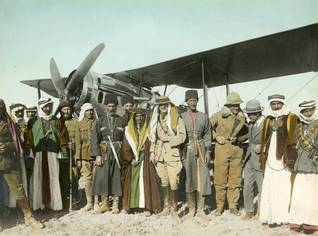
Circassians number about 200,000. They fled persecution in the late 19th century, leaving the Caucasus region for the Ottoman Empire. The incursion of the Russians into Turkey during the 1877 war forced them to move again, this time to Syria and Transjordan. Members of the Shapsug tribe were the first to settle in what is now Jordan, in 1878. Circassians in Jordan speak their own language and have their own traditions; they are Sunni Muslims. Their music and dance are very popular with other Jordanians. They came to be fully integrated into Jordanian society, through mixed marriages and education. Like other minorities, they have full citizenship and equal political rights.
Kurds
It is estimated that there are 30,000 Kurds in Jordan, including those who settled in Jordan during the last quarter of the 19th century and the first quarter of the 20th century and those who came from Palestine as refugees in 1948-1949 and 1967. Kurds live in various cities and towns around the country and are part of the social, political, and economic fabric of Jordan. Kurds are overwhelmingly Sunni.
Turkomans
The Turkomans belong to the Kara Takali tribe, part of which moved to Adana in 1870, following intertribal quarrels. They then moved to Damascus, then to Haifa, and finally, in 1874, to Balqa. Most chose to return to Turkey in 1935, but some families remained in Jordan. Their number does not exceed 25,000. Turkomans are Sunnis.
Chechens
Chechens also came to Jordan from the Caucasus, particularly from its forested mountains, where living conditions were hard. They emigrated from their homeland after clashes with the Russians in 1905 and spent a year in Anatolia before moving to Jordan in 1907. They are Sunnis, many of whom belong to the Naqshbandi tariqa (literally ‘path’ in Arabic), one of the two main Sufi orders in Sunni Islam. Their estimated population in Jordan is 15,000.
Druze
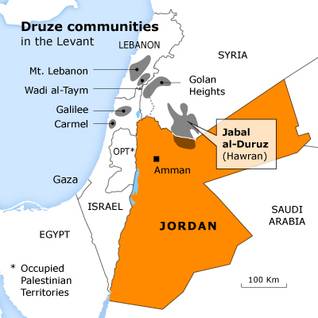
There are estimated to be 15,000 Druze in Jordan. Most live in the area of Azraq, an oasis in the western desert of Jordan. The rest live in Amman and other large cities. Druze began moving to Jordan from the Jabal al-Druze or Mount al-Duruz (near Azraq, in southern Syria), due to the deteriorating situation during the French occupation of Greater Syria between the two world wars. Although the Druze have been integrated into Jordanian culture, they have retained a strong sense of their identity and culture.
Armenians
Armenians migrated to what is now Jordan as a result of persecution and political turmoil in the latter years of the Ottoman Empire, during World War I. In 1948, their population was estimated at about 16,000. Because of high unemployment in the early 1970s, many left Jordan for the United States, the United Kingdom, Canada, and Australia, and their population dropped to 4,000. Even though Armenians in Jordan have integrated into the prevailing national culture, they, like other minorities, have retained a strong sense of their identity and have preserved their native Armenian language and culture. This integration is apparent on several levels, including acceptance of mixed marriages and affiliation with Arabic social institutions. Armenians in Jordan are predominantly Armenian Orthodox Christians.
Christians

Christianity has deep roots in Jordan, where Jesus Christ is believed to have been baptized. There were Christians in Jordan from early times, and, as Arabs, they blended in well with people of other religious beliefs. It is difficult to distinguish between Christians and Muslims in Jordan, as people share many customs and cultural traits.
The latest estimates published by the Catholic Church, on the eve of the 2009 papal visit to Jordan and the Holy Land, put the Christian population in Jordan at 3-4 percent. The number of Christians in Jordan has shrunk in recent times from 250,000 to about 170,000-190,000, due to social, economic, political, professional, and cultural pressures, as well as natural migration to more attractive countries. Christians live throughout Jordan, but mainly in the towns of Ajloun and al-Husn (in the north), Madaba and Fuheis in the center (around the capital), and Karak (further south). Most Christians in Jordan belong to the Greek Orthodox Church.
Religious freedom is guaranteed by the Jordanian Constitution. Article 6(i) of Chapter 2 stipulates that ‘Jordanians shall be equal before the law. There shall be no discrimination between them as regards their rights and duties, on grounds of race, language, or religion.’ Article 14 of the same chapter provides that ‘[T]he state shall safeguard the free exercise of all forms of worship and religious rites in accordance with the customs observed in the Kingdom unless such is inconsistent with public order or morality.’ Article 109(i), on the other hand, refers to some Christian personal-status matters to Sharia (Islamic law): ‘Tribunals of religious communities shall be established in conformity with the provisions of law pertaining thereto. Such laws shall define the jurisdiction of such tribunals in matters of personal status and waqfs (religious foundations) constituted for the benefit of the community concerned. Matters of personal status of any such community shall be the same matters as are, in the case of Muslims, within the jurisdiction of Sharia.’
In order to guarantee that the Jordanian Christian community is well represented in various political bodies, election law provides for quotas for Christians and some other minorities. The law requires that there be a number of Christians in any elected parliament. In the current Parliament, 10 of the 120 deputies are Christians. Christian citizens are regularly represented in the cabinet, the foreign service, other high government offices, and the armed forces. Christians play a vital role in all spheres of public life in Jordan: their contributions are greater than their numbers would suggest.
Christians have their own schools, churches, and social clubs. (They have the option of enrolling in the national public education system.) There are about one hundred churches in Jordan. They are respected and protected, and no case of the violation of the sanctity of Christian holy places has ever been recorded in Jordan.
Socio-economic Composition

Social institutions – traditional, such as the family and tribal system, and modern, such as family associations and charitable organizations – are very influential in the preservation of the identity of the smaller groups. They also play an important role in supporting a collective Jordanian cultural identity. Political, social, and religious leadership and civil-society organizations, too, are very influential in preserving diversity.
Jordanian law provides for and promotes tolerance. The Jordanian Constitution stipulates freedom of religion to all Jordanians, regardless of ethnic or religious origin. Access to political, civil, and welfare rights is guaranteed to all Jordanians by the Constitution and by the law of the land. Although in family matters the law is heavily influenced by Islamic jurisprudence, the Christian community has its own judicial councils to resolve disputes between followers of the various Christian denominations.
Although the Constitution and laws guarantee complete equality for all Jordanians and require freedom of religion, Jordanians of Palestinian origin tend to be discriminated against by the state. As a result, East Bank Jordanians dominate the civil service, the military, and security agencies, while Jordanians of Palestinian origin dominate the private sector.
Religious holidays are celebrated nationally. These include Eid al-Adha (or Id al-Adha, after al-hajj, or pilgrimage to Mecca) and Eid al-Fitr (after Ramadan, the month of fasting) in Islam, and the Christian holy days of Christmas and Easter. The patronage of the King of Jordan and the participation of the top political and religious leadership in these celebrations is intended to send a strong message.
The main religious and ethnic communities are represented in the Jordanian Parliament in order to allow for access to the political and legislative systems, but the parliamentary system has, in reality, been manipulated to favour East Bank Jordanians at the expense of Jordanians of Palestinian extraction.
Interfaith marriages are becoming more common and more widely accepted by society. Although there has been an Islamic resurgence in Jordan over the last decades, this has not appreciably slowed the rate of interfaith marriage and has not created a breach between the two main religious communities.
Generally, ethnic and religious groups are allowed – and sometimes encouraged – to establish community groups and cultural societies to preserve their cultural, ethnic, or religious identities and to better communicate their needs and their requests to the government and other public decision-making bodies.
Palestinian and Iraqi Refugees
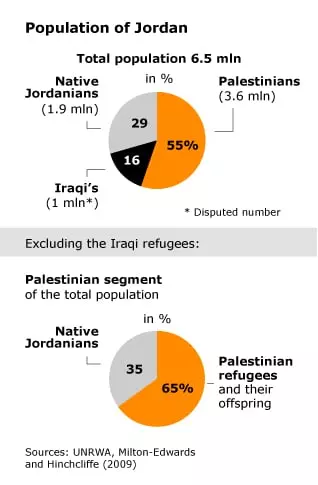
Palestinian refugees in Jordan constitute the highest percentage of the total number of Palestinian refugees registered in the areas of UNRWA operations. The presence of many common features between Palestinians and Jordanians, and strong family ties, as described by the Department of Palestinian Affairs in the kingdom, helped ease their integration into Jordanian society. In addition to the policy pursued by the Jordanian authorities to grant them Jordanian citizenship and all other citizenship rights, without prejudice to their basic rights in Palestine based on the unity agreement between the two banks (east and west banks of the Jordan River) and their right to return and compensation under United Nations Resolution No. 194 of 1948.
In 2020, the number of registered refugees in the area of UNRWA operations in Jordan reached about 2.3 million, among whom 17,000 were Palestinian refugees from the Syrian camps.
Palestinian refugees in total constitute 39.1% of the number of registered refugees in all areas of UNRWA operations. The number of refugees in the ten camps recognized by the Agency is about 396,000, constituting 17.4% of the registered refugees in the Kingdom, while the number of refugees outside the ten camps, reached 1.88 million refugees, constituting 82.6% of the registered refugees.
It is noteworthy that the number of Palestinian refugee camps in Jordan amounts to thirteen “official” camps. They provide agency services, namely Prince Hassan, Madaba, and El-Sokhna camps.
Jordan is the only Arab country that dealt with the Palestinian refugees it received on its lands as native citizens, as the Kingdom granted them the nationality, and allowed them to integrate into Jordanian society and exchange influence on the economic and social situation, without pushing them to give up their national identity.
With the beginning of the war in Iraq in 2003, hundreds of thousands of Iraqis fled their country, seeking asylum in neighboring countries. There are about two million Iraqis distributed equally between Jordan and Syria, according to the UNHCR; the two countries that were among the most generous in allowing Iraqis to enter and reside in them.
The number of Iraqi refugees in Jordan had decreased to about 195,000 by the end of 2011, be it due to voluntary return to Iraq or immigration to other countries, including European ones. Reports indicate that the number of registered Iraqi refugees decreased to 61,000 only in February 2017, and no confirmed information is available on the number of those who remained in Jordan after that date.
Palestinian refugee camps in neighbouring Arab states

Legal position Palestinians
Reflecting Jordan’s history and its often troubled relations with the Palestinians (making up approximately 60 percent of Jordan’s total population), there are no less than six basic categories of persons living in the kingdom, with widely differing rights. Jordanian passports, in themselves, confer neither citizenship nor residence rights on their bearers. Citizenship is indicated by a national identification number (ID). Citizens have the right to the residence. The residence rights of the bearers of other categories of passports are indicated by different-colored cards.
The six categories of persons, and the documentation and rights to which they are entitled, have been summarized as follows by the Forced Migration Organization:
In the above table, ‘East Banker’ means natives of the territory on the eastern side of the Jordan River (the historical boundary between Transjordan and Palestine); ‘Jordanian-Palestinian of 1948’ means Palestinians (other than those originating in the Gaza Strip) who have resided in the Kingdom of Jordan (West Bank and East Bank) since the 1948 war in Palestine; ‘Jordanian-Palestinian of 1967’ refers to Palestinian-Jordanians affected by the June 1967 Arab-Israeli War, when Jordan lost the West Bank to Israel.
Citizenship rights
When disengaging from the West Bank in July 1988, Jordan at a stroke rendered its former citizens in the West Bank stateless, stripping them of their Jordanian citizenship. They were permitted to hold Jordanian passports renewable every two years (subsequently increased to five years) but these passports do not confer either Jordanian citizenship or residency rights in Jordan. They are solely for purposes of travel.
Essentially, since 1988 the only residents with full citizenship rights have been Jordanians, whether from the East Bank or of Palestinian origin who live permanently in Jordan (i.e. the kingdom as defined territorially in 1988). Such full citizens – who comprise the great majority of Jordanians of Palestinian origin in the kingdom – have a ‘national number’ and a family registration book, and hold 5-year passports.
Palestinians living in the West Bank and East Jerusalem – which were part of the kingdom until 1988 – can hold 5-year Jordanian passports for purposes of travel; while Palestinians from the Gaza Strip can hold 2-year Jordanian passports for travel purposes only. These types of passports signify neither citizenship nor a right of residence. As non-citizens of Jordan, holders of such passports, and also holders of passports issued by the Palestinian Authority in the West Bank, are treated as foreigners. Procedures to be applied to foreigners are specified in Law No 24 of 1973 on Residence and Foreigners’ Affairs, as amended in 1987. This stipulates that foreigners require time-limited and renewable residence permits and that the relevant minister may ‘cancel a residence permit already granted to him [the foreigner] and order him to leave the Kingdom without explanation’.
The Jordanian authorities have an established record of revoking the citizenship of Palestinian-Jordanians whom they discover also to be holders of, or eligible for, passports issued by the Palestinian Authority.
The US State Department’s Country Reports on Human Rights Practices: Jordan 2010, issued on 8 April 2011, records: ‘Some persons of Palestinian origin living in the country were citizens and received passports; however, the government reported that there were approximately 165,000 Palestinian refugees, mostly of Gazan origin, who did not qualify for citizenship. Approximately half of these persons received two-year travel documents that do not connote citizenship and do not contain a national number. West Bank residents without other travel documentation were eligible to receive five-year travel documents that do not connote citizenship. Local and international human rights organizations continued to charge that the government did not consistently apply citizenship laws, especially in cases in which passports were taken from citizens of Palestinian origin or in which national identification numbers were revoked, thereby revoking citizenship.’
A Human Rights Watch (HRW) report issued in February 2010 claimed that more than 2,700 Jordanians of Palestinian origin had their citizenship revoked between 2004 and 2007. The government maintained this policy was in line with its efforts to implement its disengagement from its former claims to the West Bank. For example, government officials stated that a national number may be revoked if an individual obtains Palestinian travel documents, works for any part of the Palestinian National Authority or does not renew a family reunification permit. Activists complained that the disengagement regulations did not outline such procedures, that the process was not transparent, and that the Ministry of Interior’s appeal process was virtually nonexistent. Claimants reported that appeals were not resolved to their satisfaction. Human rights activists also claimed the government refused to renew the passports of former residents of Palestinian origin at overseas embassies. (See also the 2010 HRW report Stateless Again: Palestinian-Origin Jordanians Deprived of their Nationality)
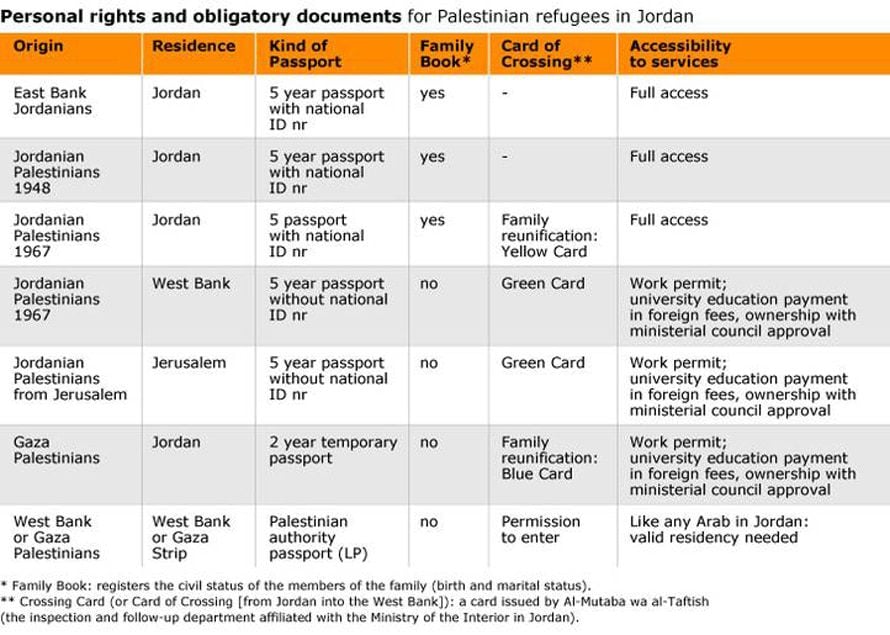
Latest Articles
Below are the latest articles by acclaimed journalists and academics concerning the topic ‘Population’ and ‘Jordan’. These articles are posted in this country file or elsewhere on our website:



